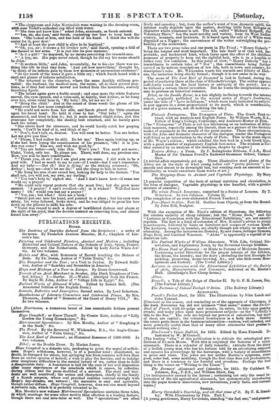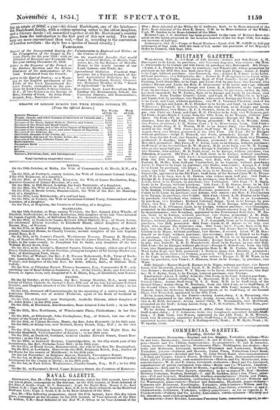PUBLICATIONS RECEIVED.
BOOM
The Doctrine of Sacrifice deduced from the Scriptures : a series of Sermons. By Frederick Denison Maurice, M.A., Chaplain of Lin- coln's Inn.
Painting and Celebrated Painters, Ancient and Modern ; including Historical and Critical.Notices of the Schools of Italy, Spain, France, Germany, and the Netherlands. Edited by Lady Jervis White Jer- vie. In two volumes.
Habits and Men, with Remnants of Record touching the Makers of Both. By Dr. Doran, Author of " Table Traits," &c.
The Bungalow and the Tent ; or a Visit to Ceylon. By Edward Sulli- van, Author of "Rambles and Scrambles in America."
Haps and Mishaps of a Tour in .Europe. By Grace Greenwood. Travels of an Arab Merchant in 'Soudan, (the Black Kingdoms of Cen-
tral Atnea.) I.—Darfur. IL—Wadai. Abridged from the French. By Bayle Bt. John, Author of "Village Life in Egypt," &c.
Poetical Works of Edmund Waller. Edited by Robert Bell. (The Annotated Edition of the English Poets.) Sonnets, Reflective and Descriptive. Second series. By Lord Robertson. Recollections of Literary Characters and Celebrated Places. By Mrs.
Thomson, Author of • Memoirs of the Court of Henry VIII.," &e. In two volumes.
[After .Heartsease, a numerous brood of. less remarkable fictions present themselves.
Hope Campbell; 'or Know Thyself. By Cousin Kate, Author of "Lilly Gordon the Young Housekeeper," &e.
Matrimonial Speculations. By Mrs. Moodie, Author of " Roughing it in the Bush, &e.
The Triad. By the Reverend W. Wickenden, B.A., the Anglo-Circas- sian, Author of " Felix Gilray," &o.
The Last Earl of Desmond; an Historical Romance of 1599-1603. In two volumes.
Ethel; or the Double Error. By Marian James.
Hope Campbell is a didactic tale, professing to point the mpral of selfish- Mss. Hope's selfishness, however, is of a peculiar kind ; manifested, no &Wit, in disregard for others, but springing less from common self-love than from an undue opinion of herself, a wish to play the heroine, and to indulge over imaginary difficulties in the mental luxury of wo, rather than to fulfil a disagreeable duty. A foundation is laid for the cure of her evil disposition after many experiences of the mischiefs which it causes, by reflection during illness and the pious deathbed of a servant. The story and inci- dents are well contrived; the scenes and characters, chiefly in the family of a Scotch surgeon, where cool practical realities contrast strongly with Hope's day-dreams, ate natural ; the narrative is easy and agreeable, though rather diffuse. Hope Campbell, however, does not rise much beyond &juvenile tale, which it is probably intended to be.
Mrs. Moodie'ir new-volume Matrimonial' Speculations contains three tales, is which marriage for-some other motive than affection is a leading feature, though there are real love-tales as well. The " speculations" are often liVely and amusing ; but, hens the author'sWant of-tisie,dramatin-Siniictlis interest really depends upon the matter, detiVingrlittle'lrfini' character where substance is nets The tale called Richard' RedpatA, she Voluntary Slave," has the most novelty and variety, from its V{ est Ittelin scenery, manners, and incidents. It is based upon the sale of a White man disguised as a Nigger ; the convenience of the writer outweighing the pro.
bability of the occurrence. - -
There are two prose tales and one poets in The Triad; "Henry Duberly" being the longest and most important. The tale itself is of 'that wild, ins. probable, and hackneyed kind, which turns upon the effort of the childless possessor of property to keep out the rightful heir, who is in a humble or rather very low condition. In this point of view, " Henry Duberly" hss a resemblance to certain tales of " Boa" ; this resemblance being fur carried on by minute descriptions of low life, both in town aid country,for description's sake. Mr. Wiokenden wants the warmth and felicity of Dick ens, the imitation being chiefly formal ; though it is not amiss in its way.
The scene of The _Last Earl of Desmond is laid in Ireland, during the period of confusion there at the close of Elizabeth's reign. The author appears sufficiently versed in the local history or antiquity of the period ; nos is he without a certain literal invention. But he wants the imaginationneees- sary to produce an historical romance.
Ethel, or the Double Error, is a tale slightly inelining.toseards the intense school, originally published in the second series of Hogg's Instructor, under the title of " Love in Idleness," which more truly indicated its subject. It now appears in a dress proportioned to its merit, which is considerable, and of a grave sadness, not ill-befitting the tale.) Platords Protagoras. The Protagoras of Plato. The Greek Text re-
vised, with an Analysis and English Notes.. By William,Wayte, Fellow of King's College, Cambridge, and Assistant-Master at Men. [The " Protagoras " of Plato is not less interesting as an indication ofAthe- nian manners, especially among the literati, than as a picture of the-Socratic modes of argument in the mouth of the great master. These circumstances, with the Attic and dramatic character of the dialogue, render the Protagoras well fitted as an introduction to the study of Plato. This is the main object of Mr. Way te's edition ; which exhibits the beet test in alseld Greek type, with a great number of explanatory English foot-notes. Thestudent is fur- ther assisted by an analysis of the dialogue, chapter by chapter.]
Tinleris Abbey ; a Poem. By F. Bolingbroke Ribbons, F.A.S., Head
Master of Sir Thomas Powell's Endowed Grammar School, Carmar- then. - [A trivial affair expensively got up. Three illuArative steel plates of the Abbey are in the style of what young ladies call "pretty pictures" ; too
smooth and decent to be downright bad, but wanting such an of in- dividuality as would constitute them works of art.] The Stepping-Stone to Animal and Vegetable Physiology. By' Mary Shield.
[A popular exposition of the facts of animal nutrition and circulation, in the form of dialogue. Vegetable physiology is also handled, with a greater mixture of anecdote.]
The whole French Language, comprised in a Series of Lessons. By T. Robertson. In two volumes. Volume II.
[The completion of an over-elaborated French Teacher.] .
Free-Hand Outline. Part IL Outline from Objects or from the Round. By John Bell, Sculptor.
With the exception of Mr. Nicol's edition of Shenstone, the following list consists entirely of cheap editions; but the "Home Book," and the "Lectures in Connexion with the Educational Eshibition," are not exactly reprints. The first is a kind of extension of Mrs. Randall:a advice to young housekeepers, followed by hints on furniture and recipes of various ,Ends. The Lectures, twenty in number, are chiefly though not wholly on modes of educating. Among the lecturers are Hensley, Rymer Junes, Jelinger Symons, Hugo Reid, and Cardinal Wiseman. "Alone" is apparently a reprint of an American tale.
The Poetical. Works of William Shenstone. With Life, Critieals Dis- sertation, and Explanatory Notes, by the Reverend George Giltillan. The Home Book of Economy : or Hints to'Persons of Moderate Income. Containing useful Directions for the proper labours of the kitchen, the house, the laundry, and the dairy' including thebest Receipts for pickling, preserving, home-brewing, &c., and also Sick-room:Man- agement and Cookery. (The Useful Library.) Lectures in connexion with the Educational Exhibition of the Society of Arts, Manufactures, and Commerce, delivered, at St. Marlin's Hall. (Routledge's New Cheap Series.)
Alone.
Russell; a Tale of the Reign of Charles IL Bye. P. R. James, Esq. (The Parlour Library.) The Fortunes of Colonel Torlogh O'Brien. (The Railway Library.)
ALMANAC S&
Punch's Poeket-Book, for 1855. The Illustrations by John Leech and John Teuniel. [Constant as the season, and reminding us of the approach. of Christmas) if the dank November fog did- not intimate "that same,"-contes the Pocket- Book of Punch, with its quips and cranks, its satire., its hits uporipassing events, and many jokes upon more permanent subjects—aa the "Loblolly's Ode to the Sea." The cuts are beyond our powers of calculation, but most of them are capital ; the coloured frontispiece- is a baby show. Besides the comic,parts there is the businessierformation—varieus, well selected, and more generally useful than that of many other almanacks that profess to furnish nothing else.).
Blackwood's. Comic Zadkiel, for 1855. Edited hy Hans FriswelL Il-
lustrated by W-M'Connell.
[The leading " idea " of this publication is to ridicule the astrological pre- dictions of Francis Moore. With this is conjoined the features of a comic almanack. There is a. calendar of daily remark-a ; extracts from the diary of a foolish young man who has his fortune told, by anadvertiaing conjuror and squares his proceedings by the horoscope, with a variety of miscellanies in prose and verse. The jokes are not unlike Martiat'e epigrams, some good, some bad, some middling; though the first class does not predominate, and there is a tendency to the forceful and overdone. Perhaps the best thing is the verses on "'Writing to the Times.") The Farmers' Ainranack and Calendar, for 1855, By Cuthbert W. - Johnson, Esq., F.R.S., and William Shaw, Esq.
[An indispensable annual to the .farmer; containing not only the usual in- tormation of the old agricultural almanack, but systematically introducing into the pages modern discoveries, new inventions, yearly facts, and current topics.]
Seams, - Harry Coverdalds Courtship, and all that came of it. By F. E. Scaed- ley. With Illustrations by Phis. Part'I. .
[A. young gentleman, Harry Coverdale, standing "six foot one," andpossess-
Dig an estate of 50001: a )'ear-hie hiend liaalehurst, one of the hrieileasa- use gar.lelitusst family, with a cotton-spinning suitor to the eldest daughter, and a literary dandy-all assembled together at old Mr. Hazlehurst's country placer form the introduction to the first part of this new serial, The man- ners are more conventional than real,-that is, according to the convention of tendon noVelists : the style has a species of forced vivacity.j
PAMPHLETS.
Rwort of the liworporateel Soeiety for the Propagation of the .Gospel in _Fo- reign Parts, for the year 1854; with an Abstract of Receipts and Payments for the year ceding December II,- 1853. letter to the Emperor of the Prench on the Eastern Question and the Behta- blishMent of the Independence of Po- land. Translated-from the French.
Leifer to the Earl of Santry; or a Warn- ing to the English purchasers of the Perlis of the nlrioh Encumbered Es- tates Court; 'exemplified in the pur- chase by Lord Charles Pelham Clinton, M.P., of two Estates in the Barony of Bete, County of Cork, By John-Pren- dergast, Esq., Barrister-at-law. Voluntaryism in England and Wales; or the Census of 1851.
On the wonderful Benefits that would arise to Great Britain, in Morals, Com- merce, Ike., by the Balance of aletanie Money to the yearly income of our Land, Labour, and Trade, Ste. Agricultural Statistics. Practical Sug- gestions for a National System of' An- nual Agricultural Statistics, &c. By James M. Buckland, Statist, Glouces- ter, Honorary Member of the "Board of Agriculture " in 1821.
Superlative Sport. Lord Brougham-Bom- barding the Brummagem School, the Currency Doctors, and Monomaniacs, &c. Second edition.

























 Previous page
Previous page